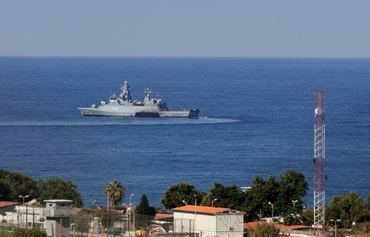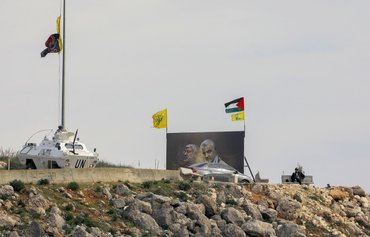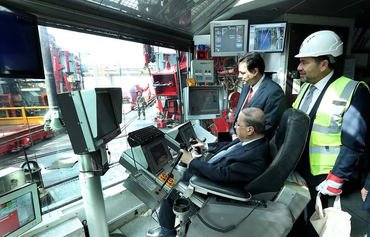Lebanon and Israel held unprecedented talks under UN and US auspices on Wednesday (October 14th) to settle a maritime border dispute and clear the way for oil and gas exploration.
The talks mark a "first step in the thousand-mile march towards the demarcation" of the sea frontier, Lebanese delegation head Brig. Gen. Bassam Yassin said in a statement released after the session ended.
"Based on the higher interests of our country, we are looking to achieve a pace of negotiations that would allow us to conclude this dossier within reasonable time," he said.
The talks were held at a UNIFIL base in the Lebanese border town of Naqoura. They came weeks after Bahrain and the UAE became the first Arab states to establish relations with Israel since Egypt in 1979 and Jordan in 1994.
A second round of negotiations will be held October 28th, a Lebanese military source and the National News Agency said.
The Naqoura talks, which focused exclusively on the disputed sea frontier, came as Lebanon, battered by multiple crises, hopes to continue exploring for oil and gas in a part of the Mediterranean also claimed by Israel, AFP reported.
US facilitates talks
Israel and Lebanon have no diplomatic relations and Wednesday's talks were a rare official interaction -- the first talks on non-military matters in decades between two countries technically still at war.
The talks follow years of US shuttle diplomacy between the two sides.
US envoy David Schenker facilitated the opening session along with US ambassador to Algeria John Desrocher, who was the mediator in the talks.
Israel sent a six-member team, including the director general of its energy ministry, Prime Minister Benjamin Netanyahu's foreign policy adviser and the head of the army's strategic division.
Lebanon's four-member delegation comprised two army officers, an official and a maritime border law expert.
The initial meeting was expected to "establish the mechanism on the basis of which negotiations will be conducted in subsequent sessions", a Lebanese Army Command source told Al-Mashareq ahead of the talks.
Negotiations were under the direct supervision of President Michel Aoun, he said.
In February 2018, Lebanon signed its first contract for offshore drilling for oil and gas in two blocks in the Mediterranean with a consortium comprising energy giants Total, ENI and Novatek.
Lebanon in April said initial drilling in Block 4 had shown traces of gas but no commercially viable reserves. Exploration of the other, Block 9, has not started and is more controversial as ownership is disputed by Israel.
Reducing regional tensions
It is hoped that the talks will enhance regional stability by reducing tension on Lebanon's southern borders and enabling it to benefit from oil resources that are currently under dispute, a military source and analysts told Al-Mashareq.
UNIFIL said it welcomed the talks, and US Secretary of State Mike Pompeo earlier hailed what he a called a historic agreement between the two countries, calling it the "result of nearly three years of intense diplomatic engagement".
The demarcation of the borders may "reduce the intensity of conflict and tension on the borders", where both Lebanon and Israel are eager to commence offshore drilling, the Lebanese Army Command source said.
But any easing of tension will be primarily contingent on the extent to which the Lebanese and Israelis commit to the agreement, he said, noting that following a border demarcation, both sides must commit to adhering to the agreement.
Another key challenge, political analyst Tony Issa told Al-Mashareq, is whether Iran-aligned parties in Lebanon "will allow the negotiations to reach a conclusion".
Maritime border disputes
Lebanon needs to demarcate its maritime borders with Israel in order to resolve the issue of two disputed offshore blocks, Block 8 and 9, said Laury Haytayan, an oil and gas expert in the Middle East and North Africa.
Demarcating the maritime borders would enable Lebanon to benefit from its oil and gas resources, she told Al-Mashareq.
"The US has sought to find a solution to the border demarcation issue since 2010," she said, noting that Lebanon entered into negotiations with the approval of the Amal movement, represented by parliament speaker Nabih Berri.
Berri is an ally of Iran-backed Hizbullah.
"We may be on the verge of having stability and tranquility on the borders following the demarcation," Haytayan said.
A key factor in addressing the maritime border disputes will be the specification of the end point of the land border at Naqoura, diplomatic affairs expert Marlène Khalife told Al-Mashareq.
This will be the starting point of the line that divides the maritime areas of the two states, she said, which will help to resolve the dispute over several maritime sites that have been a source of conflict between the two countries.

![Naqoura, a small city in southern Lebanon that lies on the coast of the Mediterranean sea, forms the sea border between Lebanon and Israel. [Photo circulated online]](/cnmi_am/images/2020/10/14/26475-Lebanon-Nakoura-border-600_384.jpg)






